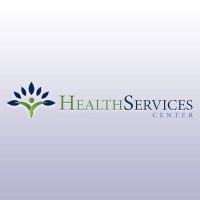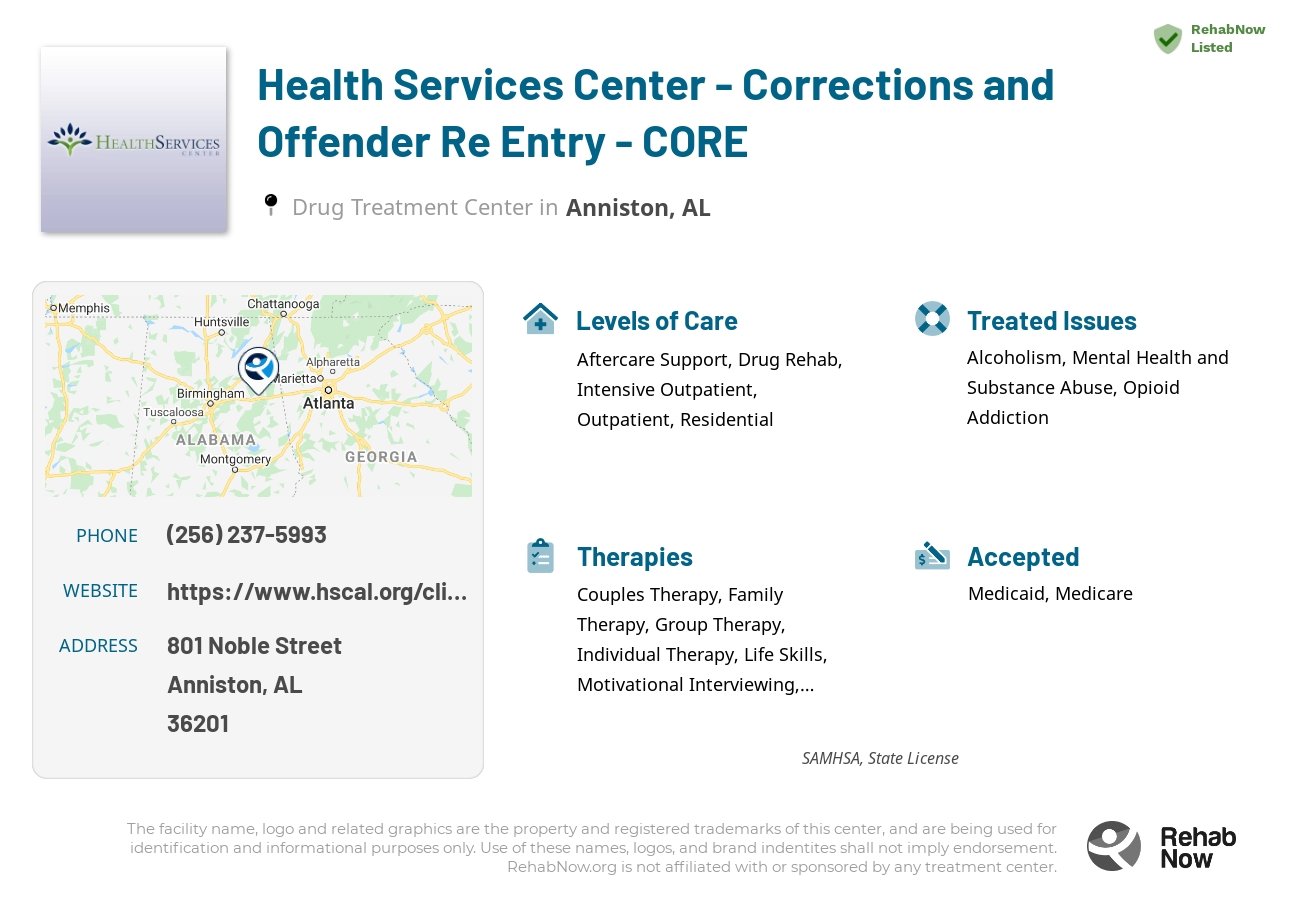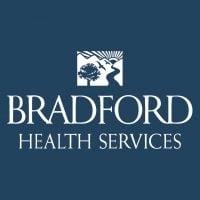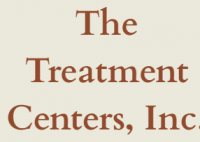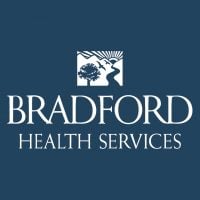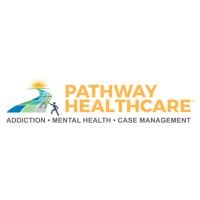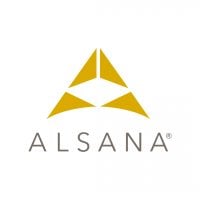Health Services Center - Corrections and Offender Re Entry - CORE
Drug Rehab Center in Anniston, Alabama
Health Services Center - Corrections and Offender Re Entry - CORE offers evidence-based treatment services for individuals with criminal justice history and substance abuse issues, including counseling, addiction education, life skills and vocational training, medication-assisted therapy, and more, with a focus on reducing recidivism and promoting successful reentry into the community.
About This Alabama Facility
Health Services Center - Corrections and Offender Re Entry - CORE is an Addiction Treatment Facility, located in Anniston, Alabama. Founded in 1990, this center specializes in treating individuals suffering from alcoholism, opioid addiction, dual diagnosis, and drug addiction. Health Services Center - CORE offers a comprehensive range of levels of care including aftercare support, drug rehab, intensive outpatient, outpatient, and residential treatment programs. The facility is accredited by the Substance Abuse and Mental Health Services Administration (SAMHSA) and holds a state license. Affiliated with Health Services Center, this treatment facility is committed to providing high-quality addiction treatment services to individuals in need.
At Health Services Center - Corrections and Offender Re Entry - CORE, patients have access to various types of services designed to address addiction and substance abuse. Their aftercare support program ensures that individuals receive continued support after completing their primary treatment. The drug rehab program offers a comprehensive and structured approach to help patients overcome their addiction. For those in need of more flexible treatment options, the intensive outpatient and outpatient programs provide the necessary support while allowing individuals to maintain their daily responsibilities. Additionally, the center offers residential treatment for individuals requiring a higher level of care and a safe and supportive environment during their recovery journey. With a focus on holistic healing and evidence-based therapies, Health Services Center - CORE is dedicated to helping individuals overcome addiction and achieve long-lasting recovery.
Genders
Ages
Modality
Additional
Accreditations
State License
SAMHSA
Conditions and Issues Treated
Opioid addiction is the result of repeated use, or abuse, of opioid drugs. It is recommended for people who are dependent on opioids, or who have a high risk for dangerous health concerns, to seek professional treatment. Treatment plans usually include behavioral therapy and medication-assisted treatment.
Opioid drugs include: fentanyl, heroin, methadone, oxycodone, and oxymorphone.
Opioid addiction treatment is beneficial for:
- People who have a history of severe withdrawal.
- People with a high risk for dangerous health concerns.
- People having difficulty overcoming opioid addiction on their own.
Levels of Care Offered at Health Services Center - Corrections and Offender Re Entry - CORE
This center offers a variety of custom treatment tailored to individual recovery. Currently available are Aftercare Support, Drug Rehab, Intensive Outpatient, Outpatient, Residential, with additional therapies available as listed below.
An Intensive Outpatient Program (IOP) is a form of drug treatment that allows individuals to receive the therapy they need while remaining in their homes and community.
An IOP is typically 3-5 days per week, at least 4 hours each day of treatment. Treatment can last for a few months or longer, depending on the situation.
An IOP is a step down from an inpatient treatment center and can be used as a step down from an inpatient stay or as a more intense form of outpatient treatment. IOPs allow for the flexibility to continue working and living at home while still meeting treatment demands.
The outpatient programs in Anniston, AL are for those addicted drugs or alcohol. The goal of the outpatient rehabilitation program is to make them stop abusing drugs or alcohol, reduce drug use or addictive behaviors, and become entirely sober. It is generally required to attend the outpatient program for 10-12 hours every week.
Patients can be administered on-the-spot medication to ease withdrawal symptoms such as anxiety, increased heart rate, and even depression. Groups such as Alcoholics Anonymous (AA) and Narcotics Anonymous (NA) can be used as a part of outpatient treatment to help maintain sobriety.
Residential treatment programs are those that offer housing and meals in addition to substance abuse treatment. Rehab facilities that offer residential treatment allow patients to focus solely on recovery, in an environment totally separate from their lives. Some rehab centers specialize in short-term residential treatment (a few days to a week or two), while others solely provide treatment on a long-term basis (several weeks to months). Some offer both, and tailor treatment to the patient’s individual requirements.
Aftercare support is a service many addicts need to ensure their success at recovery. This service usually includes one-on-one or group therapies, assistance from a sponsor and other types of help designed to make sure the patient continues living a life free from drugs.
Patients also may require medication to help them battle addiction. Some people have been able to successfully recover without additional medications, but others have found that they need help during their transition. Long-term, the patient must take the initiative to attend meetings and receive help from other addicts in recovery.
Therapies & Programs
People in addiction recovery can benefit from individual therapy. This type of therapy involves meeting with a therapist one-on-one. This allows for a personal and trusting relationship to be built so that the patient can be truly themselves and express any emotions they feel. Individual therapy leads to greater understanding and peace about your triggers for addiction and coping strategies to prevent relapse.
Couples therapy for drug addiction is based on the belief that addiction is a family disease. Everyone involved with an addict, not just the addict themselves, is affected by their behavior and the changes the addict goes through. The relationship also changes the addict’s significant other and has likely picked up some codependent behaviors. Codependency is a term used to describe a person obsessed with another person and their needs and feelings while neglecting their own. Addicts are usually people-pleasers, so it is understandable how one can become codependent in relationships with addicts.
Family therapy is a type of group problem-solving that aims to improve communication and relationships between the patient, their family, and sometimes friends. The main goal of family therapy for drug addiction is to create an environment where communication can occur without judgment, hostility, or blame. The therapist is with the family as they learn to communicate with each other differently, especially with the addict when s/he is using.
Group therapy sessions are held in rehab facilities, clinics, churches or community centers that offer drug addiction treatment. People who attend these groups are encouraged to voice their feelings and support other addicts in recovery. This helps group members strengthen their own recovery program while cheering on others who are struggling with sobriety.
Group therapy sessions provide recovering addicts with a chance to cope with everyday situations that many face. Group therapy sessions are held in rehab facilities, clinics, churches or community centers that offer drug addiction treatment.
People who attend these groups are encouraged to voice their feelings and support other addicts in recovery. This helps group members strengthen their own recovery program while cheering on others who are struggling with sobriety.
Cognitive Behavioral Therapy (CBT) helps addicts identify faulty, negative thinking so that they can work together with the therapist to find healthier ways of thinking. CBT focuses on specific aspects of each person’s thinking, feeling, physiology, and behavior. It aims to identify specific problems in these areas, and create a personalized treatment strategy.
Rational Emotional Behavior Therapy is a unique type of therapy because it helps addicts understand their emotional behavior to help them stay sober. It breaks down the addiction and behaviors behind it.
Rational Emotional Behavior Therapy aims to help you understand your emotions and how they affect your behaviors and addiction. Those that complete the program will be able to:
- Change their behaviors in a positive way
- Identify their feelings and reactions
Life Skills Services offered at Health Services Center - Corrections and Offender Re Entry - CORE assists addicts in their recovery by teaching them healthy coping mechanisms that will aid them in becoming sober, focussing on helping people enter into, and maintaining long-term sobriety. Health Services Center - Corrections and Offender Re Entry - CORE provide Life Skills Services at varying levels of intensity, specific to the needs and requirements of each patient.
Benefits of Life Skills Services offered at Drug Treatment Centers in Alabama:
- Restores hope and empowerment — Helps addicts believe that recovery is possible and instills a new confidence in their ability to achieve a positive, drug-free future
- Enhances family involvement — Encourages families to get involved in the recovery process and supports their understanding and encouragement of healthy behavior.
- Increases patient’s compliance — Helps patients take responsibility for and ownership of their recovery and encourages continued progress
- Reduces relapse rates — Encourages long-term abstinence and emphasizes the importance of establishing sober support systems.
Payment Options Accepted
For specific insurance or payment methods please contact us.
Health Services Center Associated Centers
Discover treatment facilities under the same provider.
- Health Services Center - CORE Calhoun County in Anniston, AL
- Health Services Center - Anniston in Anniston, AL
Learn More About Health Services Center Centers
Additional Details
Specifics, location, and helpful extra information.
Anniston, Alabama 36201 Phone Number(256) 237-5993 Meta DetailsUpdated November 25, 2023
Staff Verified
Patient Reviews
There are no reviews yet. Be the first one to write one.
Anniston, Alabama Addiction Information
Opioids, such as heroin, fentanyl, and prescription opioids are related to more than half of all drug-related overdoses in Alabama. Alcohol is the most frequently used substance in Alabama; 85,000 Alabamians use cocaine every single year. In Alabama, there are four times as many vehicle crashes involving alcohol as there are normal vehicle crashes.
In Anniston, Alabama, drug addiction and abuse have a big impact on the community. Over 60% of high school students in Anniston report that they have been offered drugs on school property. The overdose death rate in Anniston increased by 23% from 2014 to 2015. There are many different types of drug treatment available in Anniston, Alabama. Some common options include inpatient and outpatient rehab and detox programs.
Treatment in Nearby Cities
- Bay Minette, AL (222.9 mi.)
- Marion, AL (111.6 mi.)
- Tuscaloosa, AL (105.0 mi.)
- Sheffield, AL (131.6 mi.)
- Thorsby, AL (72.4 mi.)
Centers near Health Services Center - Corrections and Offender Re Entry - CORE
The facility name, logo and brand are the property and registered trademarks of Health Services Center - Corrections and Offender Re Entry - CORE, and are being used for identification and informational purposes only. Use of these names, logos and brands shall not imply endorsement. RehabNow.org is not affiliated with or sponsored by Health Services Center - Corrections and Offender Re Entry - CORE.
